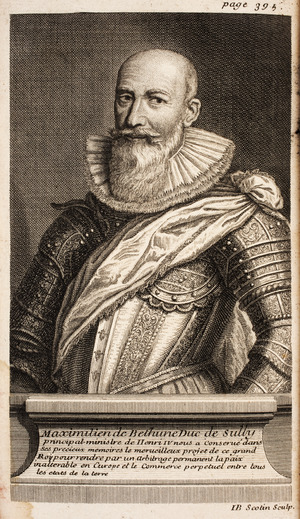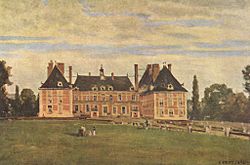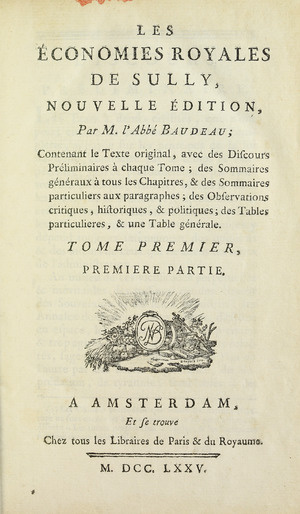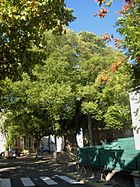Maximilien de Béthune, Duke of Sully facts for kids
Quick facts for kids
Prince of Sully
Maximilien de Béthune
GMA
|
|
|---|---|
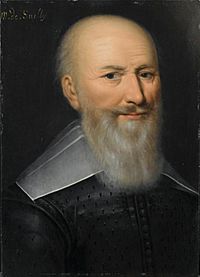
Maximilien de Béthune in 1630.
|
|
| Chief Minister of France | |
| In office 2 August 1589 – 29 January 1611 |
|
| Monarch | Henry IV Louis XIII |
| Succeeded by | Nicolas de Neufville |
| Superintendent of Finances | |
| In office 1600 – 26 January 1611 |
|
| Monarch | |
| Preceded by | Henry I of Montmorency (first of a council) |
| Succeeded by | Pierre Jeannin (first of a council) |
| Personal details | |
| Born | 13 December 1560 Rosny-sur-Seine, France |
| Died | 22 December 1641 (aged 81) Villebon, France |
| Spouses |
Anne de Courtenay
(m. 1583; died 1589)Rachel de Cochefilet
(m. 1592; died 1641) |
| Children |
|
| Parents | François de Béthune and Charlotte Dauvet |
| Military service | |
| Allegiance | |
| Branch/service | Royal Army |
| Years of service | 1576–1598 |
| Rank | Marshal of France |
| Battles/wars | French Wars of Religion (1562–1598):
Rohan Wars (1621–1629):
|
Maximilien de Béthune (born December 13, 1560 – died December 22, 1641) was an important French nobleman, soldier, and statesman. He was a trusted advisor to King Henry IV of France. Sully, as he was known, played a key role in making France strong again after many years of religious wars. He helped create a more organized government and improved the country's finances. His ideas helped France recover and become more stable.
Contents
Maximilien de Béthune's Life Story
Early Years and Escape
Maximilien de Béthune was born at the Château de Rosny-sur-Seine in France. His family was noble and followed the Reformed faith, meaning they were Huguenots (French Protestants).
In 1571, when he was just eleven, Maximilien met Henry of Navarre. He became a close companion to Henry, who would later become the King of France. Maximilien was studying in Paris during the terrible St Bartholomew's Day Massacre. He managed to escape by pretending to be Catholic, carrying a Catholic prayer book. He later studied math and history at Henry of Navarre's court.
A Brave Soldier with Henry IV
When civil war started again in 1575, Maximilien joined the Protestant army. He showed great courage in battles and was skilled as a military engineer. He rejoined Henry of Navarre and was seriously hurt at the Battle of Ivry in 1590.
Maximilien advised Henry IV to become a Roman Catholic. This was a big step that helped Henry become king. However, Maximilien himself remained a Protestant. After Henry IV became king, Maximilien received many rewards for his loyalty and service.
Sully's Rise to Power
From 1596, Maximilien, now known as Sully, began to fix France's money problems. He became the main Superintendent of Finances in 1601. He allowed farmers to sell grain and wine freely. He also reduced interest rates and stopped corrupt tax practices.
Sully saved a lot of money for France. Between 1600 and 1610, he saved about one million livres each year. This was a huge amount for that time.
His achievements were not just about money. He was put in charge of roads, public works, and fortifications. He also became the Grand Master of Artillery. In 1606, he was made the first Duke of Sully. He was offered the top military job, constable of France, but he refused because he would not become Catholic.
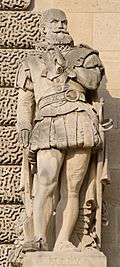
Sully strongly supported agriculture. He wanted farmers to be able to sell their goods easily. He also encouraged raising livestock and protected forests. He helped drain swamps and built many roads and bridges. He even started building a large canal system, including the Canal de Briare.
He also made the French military stronger. Under his leadership, new defenses were built along the country's borders. Sully helped Henry IV stop rebellions by nobles. He also arranged the marriage between Henry IV and Marie de' Medici.
Sully's Later Years
Sully's political career mostly ended when Henry IV was killed on May 14, 1610. Henry IV was on his way to visit Sully when he was assassinated.
Sully was part of the Queen's council that ruled after Henry's death. But other members did not like his strong leadership. He resigned from his finance job in January 1611 and retired.
The queen mother gave him a large sum of money for his service. He attended a meeting of the Estates-General in 1614. He generally agreed with the policies of Cardinal Richelieu. He was briefly arrested in 1622.
He was given the title of marshal of France in 1634. Sully spent his last years at his homes in Villebon, Rosny, and Sully. He died at the age of 81.
Sully's Family Life
Sully had one son, Maximilien, with his first wife, Anne de Courtenay. After Anne died, he married Rachel de Cochefilet in 1592. Rachel became a Protestant to be with him. They had nine children, but six of them died young. Their son François became the first Duke of Orval. Their daughter Marguerite married Henri, Duke of Rohan.
Sully's brother, Philippe de Béthune, was an ambassador to Scotland in 1599.
Sully's Accomplishments and Legacy
Sully was not always popular. Some people found him selfish and rude. He was a Protestant, which made many Catholics dislike him. Protestants sometimes disliked him because he was so loyal to the king. He also became very wealthy.
However, Sully was an excellent manager. He was strict about punishing dishonesty and stopped wasteful spending by the court. He was confident, hardworking, and deeply devoted to King Henry IV. He was the king's most important helper in bringing order back to France after years of war.
After Henry IV died, Sully published his "Grand Design." This was a plan to stop religious wars in Europe. He believed that the three main churches (Catholic, Lutheran, and Calvinist) would continue to exist. His plan suggested an international organization with 15 equally strong European countries. This group would have a permanent assembly of ambassadors to prevent wars. Military power would only be used against the Ottoman Empire. This "Grand Design" is seen as one of the first ideas for a peaceful European Union.
Titles Held by Sully
During his life, Sully held many important titles:
- Duke of Sully
- Peer of France
- Marshal of France
- Sovereign Prince of Henrichemont and Boisbelle
- Marquess of Rosny
- Marquess of Nogent-le-Béthune
- Count of Muret
- Count of Villebon
- Viscount of Meaux
- Viscount of Champrond
- Baron of Conti
- Baron of Caussade
- Baron of Montricoux
- Baron of Montigny
- Baron of Breteuil
- Baron of Francastel
- Lord of La Falaise
- Lord of Las
- Lord of Vitray
- Lord of Lalleubellouis
- Lord of various other places
Sully's Writings
Sully wrote a collection of memoirs called Mémoires or Économies royales (published in 1638). These writings are very important for understanding the history of that time. They also tell his life story, though some parts are fictional. For example, he wrote about a trip to meet Queen Elizabeth I of England in 1601, which never happened.
His most famous idea in these writings was the "Grand Design." This was a utopian plan for a "Christian republic" in Europe. It suggested that Europe should have 15 roughly equal states. These states would be guided by a "Very Christian Council of Europe." This council would solve problems and have a common army. This plan is often seen as an early idea for the European Union.
Places Named After Sully
- The Pavillon Sully (also known as Pavillon de l'Horloge) at the Palais du Louvre in Paris is named in his honor.
- The Ormeau Sully, a very old elm tree, is believed to have been planted by Sully. It still stands in the village of Villesequelande.
- He started building a capital city called Henrichemont in the independent principality of Boisbelle, which he acquired.
- Many buildings in Paris, like the Place Royale, the Hopital Saint-Louis, and the Arsenal, were built or improved under his direction.
Sully in Stories
- Maximilien de Béthune appears in the 1938 book Die Vollendung des Königs Henri Quatre by Heinrich Mann.
- He is the main character in the 1893 romance novel From the Memoirs of a Minister of France by Stanley Weyman.
See also
 In Spanish: Maximilien de Béthune para niños
In Spanish: Maximilien de Béthune para niños
 | Delilah Pierce |
 | Gordon Parks |
 | Augusta Savage |
 | Charles Ethan Porter |


